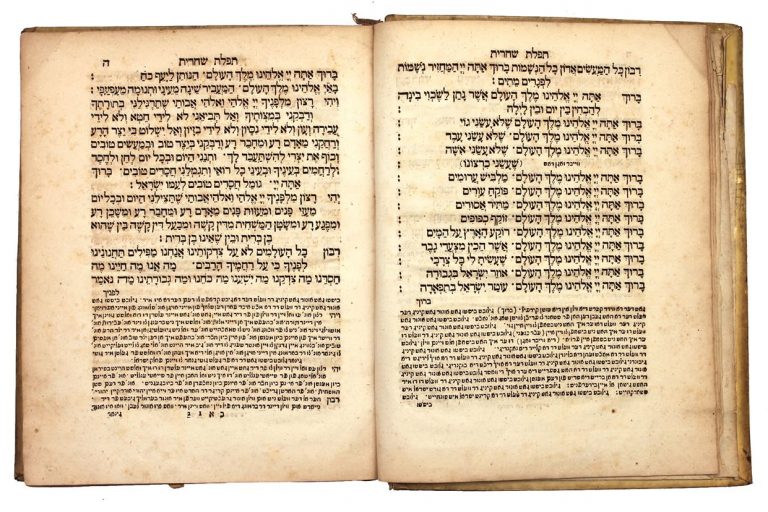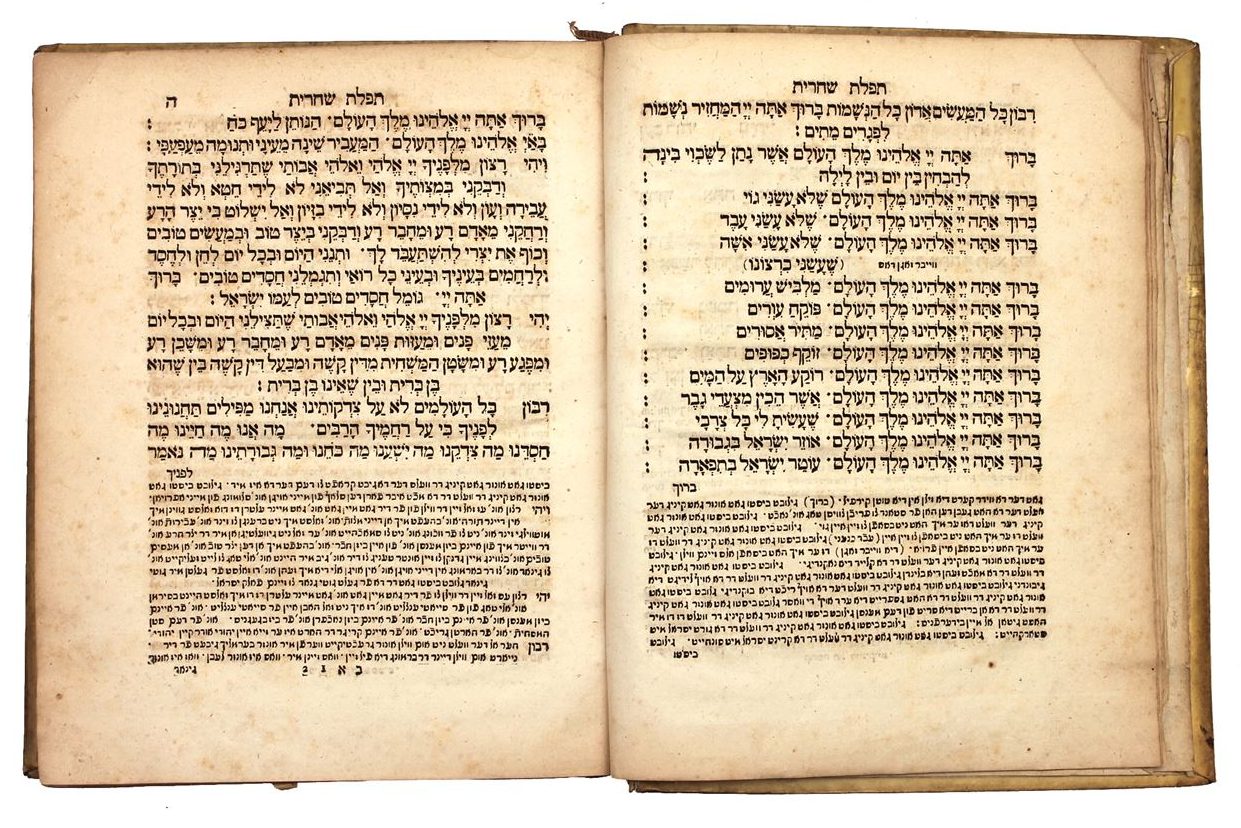Kol Nidrei
On the eve of Yom Kippur while there is still daylight, Jews congregate all across the globe wearing white. They don their tallitot (prayer shawls) and Kol Nidrei is chanted with a sense of emotional anticipation and a centuries-old feverishly moving melody.
 Dating back until at least the ninth century, Kol Nidrei, at first glance, seems to have nothing at all to do with Yom Kippur. Indeed, it appears to attempt to release one from keeping his oaths and vows. Many commentators address this issue and their main approach seems to be that Kol Nidrei, in actuality, emphasizes the importance of keeping one’s word and reaffirms our belief of honoring our commitments. How appropriate, as we enter a day when we will be saying over and over how we plan to change and do teshuvah.
Dating back until at least the ninth century, Kol Nidrei, at first glance, seems to have nothing at all to do with Yom Kippur. Indeed, it appears to attempt to release one from keeping his oaths and vows. Many commentators address this issue and their main approach seems to be that Kol Nidrei, in actuality, emphasizes the importance of keeping one’s word and reaffirms our belief of honoring our commitments. How appropriate, as we enter a day when we will be saying over and over how we plan to change and do teshuvah.
Over the years various versions of Kol Nidrei have been adopted in various places. Indeed, the version found in most siddurim actually contain parts of each version. This stems from a machlokes (halachic dispute) over whether Kol Nidrei is to annul vows from the past year (Babylonian traditional) or to declare annulled all vows of the coming year (European tradition, Tosafot).
The Shema
During the Shema on Yom Kippur, the second line, Baruch Shem Kavod Malchuto LeOlam Va’ed, “Blessed is the Name of His Glorious Kingdom for all eternity” is read aloud. Moshe originally heard this line from the angels when he was on Mount Sinai receiving the Torah from G-d. Though normally said quietly, on Yom Kippur it is said out loud. Normally, we dare not utter angelic phrases loudly, but on Yom Kippur, it is as if we are spiritually raised to the level of angels and we say the verse out loud.
Avinu Malkeinu
The Gemara in Taanis tells the story of when there was a very bad drought in Eretz Yisrael , the land of Israel. Public fasts were proclaimed and special prayers were said. The great Torah Scholar Rabbi Eliezer was called upon to lead the prayers with the saying of the 24 blessing Amidah, which is said at times of severe drought. Yet, no rain fell. His disciple, Rabbi Akiva came to the front and said a special prayer in which each verse began with the words, Avinu Malkenu, Our Father, Our King. Rain fell. The prayer became a regular part of the prayer services during a time of fasting or tragedy. Today, it is said fast days and during the ten days of repentance. On Yom Kippur, during Neilah, the word ketiva, inscribed is replaced by chatima, sealed, because in the Neilah prayer G-d seals our fate for the coming year.
Viduy
Confession, is an essential part of repentance. Repentance cannot be just a fleeting thought like other thoughts that come and go in a person’s mind. By confessing one’s sins out loud, it becomes something much more real. A person must come to the complete understanding that the sins he committed are wrong and cannot be rationalized away.
The two forms of confession, Al cheit and Ashamnu, alphabetically list all types of sins. The Al cheit, prayer lists many sins or categories of sins that are commonly committed. Sins are expressed in the plural not only to save individuals from embarrassment but so that the congregation as a whole might attain true atonement. One cannot confess only for oneself, rather one has to beg forgiveness for all Jews who sin. As the Rav Issac Luria, 16th Century Kabbalist, wrote that confession is written in the plural, “We have sinned‘ because all Israel is considered like one body and every person is a limb of that body. So we confess to all the sins of all the parts of our body.
If you read the Al cheit carefully, you will see that the list of sins is not a list of the Mitzvot. Rather, it is a list of categories of sins that are the most common. Many relate to our misuse of speech and having the wrong type of thoughts or attitude. Some have to do with more concrete mitzvot like shabbat or Kashrut. All relate to us in way or another. Of course, one should not feel limited to confess only the list of sins printed in the siddur, one should mention viduy any specific sins which he or she may have committed. It is customary to gently beat one’s chest during the viduy, as if to say that your heart may have led you astray in the past but hopefully, this will not happen in the future.
Neilah
A Jew prays three times a day on weekdays. On Shabbat and Holidays, including Rosh HaShanah a fourth service is added (Mussaf) in memory of the additional sacrifices given on these days in the Temple in Jerusalem.
On Yom Kippur, yet a fifth service (the only day of the year with 5) is added. The extra service unique to Yom Kippur is called Neilah.
Neilah is said after Mincha as the sun is going down and literally means closing (or locking) and refers to either the closing of the gates of the Holy Temple at the end of the day or it refers to the closing of the gates of prayer as Yom Kippur is ending .
The Neilah service contains stirring pleas that our prayers be accepted by G-d before Yom Kippur ends. The heavenly judgment inscribed on Rosh Hashanah is now sealed during Neilah. The chazan chants the service in a special melody designed to stir the emotions and bring the congregation to greater devotion.
There are a number of customs that have become well accepted in connection with Neilah. Usually the Rabbi or Rosh Yeshiva (head of Jewish studies school) or the Village Elder will speak before the Neilah service to inspire the congregants to pray more fervently. In many congregations he will himself lead the service instead of the cantor – again – expressing the hightened sence of urgency.
The Aron HaKodesh (Holy Ark that contains the congregation’s Torah scrolls) is kept open for the entire service. Those able to stand up for the entire time, do so.
Selichot (prayers of repentance) are recited and Avinu Malkeinu (Our Father Our King) is said even when Yom Kippur falls out on Shabbat.
Following Neilah, the shofar is sounded with one great and mighty long blast and the services conclude with the exclamations of Shema Yisrael – Hear O Israel and Next Year In Jerusalem – LeShana Haba B’Yerushalayim…



